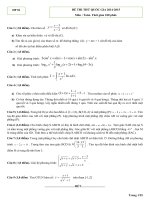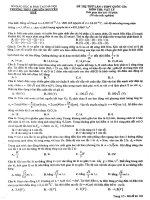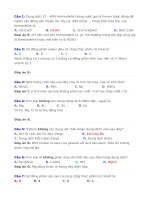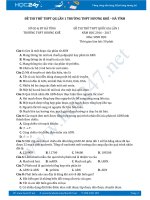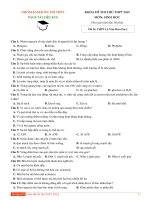- Trang chủ >>
- Y - Dược >>
- Ngoại khoa
Đề thi thử thpt quốc gia 2021 môn Anh trường THPT Lê Văn Hưu lần 1
Bạn đang xem bản rút gọn của tài liệu. Xem và tải ngay bản đầy đủ của tài liệu tại đây (124.12 KB, 9 trang )
<span class='text_page_counter'>(1)</span><div class='page_container' data-page=1>
<b>ĐỀ THI THỬ THPTQG MÔN TIẾNG ANH</b>
<b>NĂM 2021 CÓ ĐÁP ÁN</b>
<b>Mark the letter A, B, C, or D on your answer sheet to indicate the sentence that is closest</b>
<b>in meaning to each of the following questions. </b>
<b>Question 1: “What did you do last night?” the policeman asked the woman. </b>
<b>A. The policeman asked the woman what did she do the night before. </b>
<b>B. The policeman asked the woman what she had done the night before. </b>
<b>C. The policeman asked the woman what had she done the night before. </b>
<b>D. The policeman asked the woman what she did the night before. </b>
<b>Question 2: I could not get the job because I did not speak English well. </b>
<b>A. I would have spoken English well if I could get that job. </b>
<b>B. I wish I had got the job so that I could speak English well. </b>
<b>C. Despite my poor English. I was successful in the job. </b>
<b>D. I failed to get the job because of my poor English. </b>
<b>Question 3: “Why don’t you go to bed earlier?”, she said to me. </b>
<b>A. She suggested that I went to bed earlier. </b>
<b>B. She asked me why I don’t go to bed earlier. </b>
<b>C. She suggested I should go to bed earlier. </b>
<b>D. She asked me to go to bed earlier. </b>
<b>Mark the letter A, B, C, or D on your answer sheet to indicate the word whose underlined</b>
<b>part differs from the other three in pronunciation in each of the following questions. </b>
<b>Question 4: A. pressure </b> <b>B. future </b> <b>C. enthusiasm </b> <b>D. resume </b>
<b>Question 5: A. played </b> <b>B. tried </b> <b>C. smiled </b> <b>D. wanted </b>
<b>Mark the letter A, B, C, or D on your answer sheet to indicate the word that differs from</b>
<b>the other three in the position of primary stress in each of the following questions. </b>
<b>Question 6: A. admit </b> <b>B. suggest </b> <b>C. remind </b> <b>D. manage </b>
</div>
<span class='text_page_counter'>(2)</span><div class='page_container' data-page=2>
<b>best combines each pair of sentences in the following questions. </b>
<b>Question 8: He had hardly left the office when the phone rang. </b>
<b>A. No sooner he had left the office than the phone rang. </b>
<b>B. No sooner had he left the office than the phone rang. </b>
<b>C. No sooner he had left the office when the phone rang. </b>
<b>D. No sooner he did left the office than the phone rang. </b>
<b>Question 9: Some people were diagnosed with having Covid-19. They had exposed to so many</b>
people before they got the health check result.
<b>A. Some people whom was diagnosed with having Covid-19 had exposed to so many people</b>
before they got the health check result.
<b>B. Some people whose diagnosed with having Covid-19 had exposed to so many people</b>
before they got the health check result.
<b>C. Some people diagnosing with having Covid-19 had exposed to so many people before</b>
they got the health check result.
<b>D. Some people diagnosed with having Covid-19 had exposed to so many people before</b>
they got the health check result.
<b>Mark the letter A, B, C, or D on your answer sheet to indicate the correct answer to each</b>
<b>of the following questions. </b>
<b>Question 10: Since we came here, we________ a lot of acquaintances. </b>
<b>A. have had </b> <b>B. had </b> <b>C. have </b> <b>D. are having </b>
<b>Question 11: The situation of COVID-19 worldwide is still serious, _______? </b>
<b>A. is it </b> <b>B. doesn’t it </b> <b>C. isn’t it </b> <b>D. is not it </b>
<b>Question 12: They began the party after every dish________ ready. </b>
<b>A. is </b> <b>B. was </b> <b>C. had been </b> <b>D. were </b>
<b>Question 13: ______ his physical disability, he managed to finish the course with good results. </b>
<b>A. Although </b> <b>B. Since </b> <b>C. Because of </b> <b>D. Despite </b>
<b>Question 14: If he_____ the lesson yesterday, he could do the test better today. </b>
<b>A. has reviewed </b> <b>B. had reviewed </b> <b>C. will review </b> <b>D. reviewed </b>
<b>Question 15: My teacher reminded me _____ my essay carefully before handing it in. </b>
</div>
<span class='text_page_counter'>(3)</span><div class='page_container' data-page=3>
<b>Question 16: It is advisable that you ______ your application as soon as possible. </b>
<b>A. submit </b> <b>B. will submit </b> <b>C. will have submitted </b> <b>D.</b> <b> have</b>
submitted
<b>Question 17: Every student ____ in English is ready to participate the orchard contest. </b>
<b>A. majors </b> <b>B. majoring </b> <b>C. to major </b> <b>D. majored </b>
<b>Question 18: _____ colleges and ____universities are the main institutions that provide tertiary</b>
education.
<b>A. 0-0 </b> <b>B. 0-the </b> <b>C. The-0 </b> <b>D. The-the </b>
<b>Question 19: Ensure that your ________ behavior matches what you are saying. </b>
<b>A. verbal </b> <b>B. non-verbal </b> <b>C. tongue </b> <b>D. oral </b>
<b>Question 20: They appeared _______ pessimistic about their chances of winning. </b>
<b>A. surprisingly </b> <b>B. advisedly </b> <b>C. firmly </b> <b>D. repeatedly </b>
<b>Question 21: I_______ my chance to get that job because I had arrived late for the interview. </b>
<b>A. threw </b> <b>B. flew </b> <b>C. blew </b> <b>D. drew </b>
<b>Question 22: ______ are the formal rules of correct or polite behavior among people using the</b>
Internet.
<b>A. Traffic rules </b> <b>B. Family rules </b> <b>C. Codes of etiquettes </b> <b>D. Codes of</b>
netiquettes
<b>Question 23: I believe that she’ll ______ the failures she has got. </b>
<b>A. get on with </b> <b>B. get up to </b> <b>C. get through </b> <b>D. grow out of</b>
<b>Mark the letter A, B, C, or D on your answer sheet to indicate the word(s) CLOSEST</b>
<b>in meaning to the underlined word(s) in each of the following questions. </b>
<b>Question 24: He has a thorough </b>knowledge of the Vietnamese history. He can answer any
questions about the country’s milestones.
<b>A. complete </b> <b>B. practical </b> <b>C. wonderful </b> <b>D. whole </b>
<b>Question 25: Students from that university have conducted </b>a survey to find out the most
effective study habit.
<b>A. organized </b> <b>B. delayed </b> <b>C. encouraged </b> <b>D. proposed</b>
</div>
<span class='text_page_counter'>(4)</span><div class='page_container' data-page=4>
<b>Question 26: Liam and Kara are having a discussion about learning new skills. </b>
Liam: I think that self-leadership is a crucial skills for everyone nowadays”
Kara: “_______. It greatly helps us achieve success.”
<b>A. I don’t think it’s right B. I don’t understand </b> <b>C. You may be wrong </b> <b>D. I definitely</b>
agree
<b>Question 27: Tom: “I thought your performance last Sunday was wonderful” - Laura:</b>
“________.”
<b>A. Don’t tell a lie. I thought it was terrible </b>
<b>B. I completely agree with you. It was terrific </b>
<b>C. You must be kidding. It was not as good as I had expected </b>
<b>D. No doubt! </b>
<b>Read the following passage and mark the letter A, B, C, or D on your answer sheet</b>
<b>to indicate the correct word or phrase that best fits each of the numbered blanks from 28</b>
<b>to 32. </b>
My first job was a sales assistant at a large department store. I wanted to work part–time,
because I was still studying at university and I was only able to work a few nights a week.
I came across the advertisement in the local newspaper. I remember the interview as though
it were yesterday. The (28) ______ manager sat behind a large desk. He asked me various
questions which surprised me because all I wanted was to work in sales. An hours later, I was
told that I had got the job and was given a contract to go over. I was to be trained for ten days
before I took my post. Also, as a member of staff, I was (29) ______ to some benefits, including
discounts. When I eventually started, I was responsible (30) ______ the toy section. I really
enjoyed it there and I loved demonstrating the different toys. I was surprised at how friendly my
colleagues were, too. They made working there fun even when we had to deal with customers
(31) ______ got on our nerves. (32) ______, working there was a great experience which I
will never forget.
<b>Question 28: A. person </b> <b>B. personal </b> <b>C. personage </b> <b>D. personnel </b>
<b>Question 29: A. entitled </b> <b>B. given </b> <b>C. catered </b> <b>D. supplied </b>
<b>Question 30: A.in </b> <b>B. with </b> <b>C. for </b> <b>D. to </b>
</div>
<span class='text_page_counter'>(5)</span><div class='page_container' data-page=5>
<b>Question 32: A. By contrast B. However </b> <b>C. Moreover </b> <b>D. On the</b>
whole
<b>Mark the letter A, B, C, or D on your answer sheet to indicate the word(s) OPPOSITE in</b>
<b>meaning to the underlined word(s) in each of the following questions. </b>
<b>Question 33: My cousin tends to look on the bright side in any circumstances. </b>
<b>A. be confident </b> <b>B. be pessimistic </b> <b>C. be optimistic </b> <b>D. be smart </b>
<b>Question 34: They started on the study excitedly. They had prepared all the need things for it. </b>
<b>A. emphasized </b> <b>B. concluded </b> <b>C. included </b> <b>D.</b>
summarized
<b>Read the following passage and mark the letter A, B, C, or D on your answer sheet to</b>
<b>indicate the correct answer to each of the questions from 30 to 34. </b>
</div>
<span class='text_page_counter'>(6)</span><div class='page_container' data-page=6>
the week camping in tents. But students only pay around 250 dollars for meals and
transportation, which is much less than some of their peers spend to travel to more traditional
spring break hotspots.
Alternative spring break trips appear to be growing in popularity at universities across the
United States. Students cite a number of reason for participating. Some appreciate the
opportunity to socialize and meet new friends. Others want to exercise their beliefs about
people’s obligation to serve humanity and make the world a better place whatever their reason,
these students have discovered something that gives them rich rewards along with a break from
school work.
<i>(Source: FCE success workbook) </i>
<b>Question 35: What is the passage mainly about? </b>
<b>A. Students travelling preferences </b> <b>B. A traditional approach to spring</b>
breaks
<b>C. American student’s social life </b> <b>D. Students’ alternative spring breaks </b>
<b>Question 36: How many university students travel to Panama Beach City every March for</b>
spring break?
<b>A. Around 10,000 </b> <b>B. Around 36,000 </b> <b>C. Around 500,000 </b> <b>D.</b> <b> Around</b>
50.000
<b>Question 37: The word “cite” in paragraph 2 probably means_______. </b>
<b>A. listing </b> <b>B. getting </b> <b>C. avoiding </b> <b>D. inventing </b>
<b>Question 38: The word “them” in paragraph 1 refers to_____. </b>
<b>A. degrees </b> <b>B. people </b> <b>C. projects </b> <b>D. students </b>
<b>Question 39: Which of the following is NOT mentioned as a problem that alternative spring</b>
break trips to help solve?
<b>A. Environment damage </b> <b>B. Homelessness </b> <b>C. Poverty </b> <b>D.</b>
Overpopulation
<b>Read the following passage and mark the letter A, B, C, or D on your answer sheet to</b>
<b>indicate the correct answer to each of the questions from 40 to 47. </b>
</div>
<span class='text_page_counter'>(7)</span><div class='page_container' data-page=7>
How much will artificial intelligence advance? Will global warming trigger catastrophic
changes, or will we be able to engineer our way out of the climate change crisis?
Making predictions is, by nature, a dicey business, but to celebrate the 40th anniversary of
Smithsonian magazine Big Think asked top minds from a variety of fields to weigh in on what
the future holds 40 years from now. The result is our latest special series, Life in 20 50.
Demographic changes in world population and population growth will certainly be dramatic.
Rockefeller University mathematical biologist Joel Cohen says it's likely that by 2050 the
majority of the people in the world will live in urban areas, and will have a significantly higher
average age than people today. Cities theorist Richard Florida thinks urbanization trends will
reinvent the education system of the United States, making our economy less real estate driven
and erasing the divisions between home and work.
Large migrations from developing countries like Indonesia, Malaysia, Bangladesh, Mexico,
and countries in the Middle East could disrupt western governments and harm the unity of
France, Germany, Spain, the Netherlands, Poland, and the United Kingdom under the umbrella
of the European Union.
And rapidly advancing technology will continue ever more rapidly. According to Bill
Mitchell, the late director of MIT's Smart Cities research group, cities of the future won't look
like "some sort of science -fiction fantasy" or "Star Trek" but it's likely that "discreet,
unobtrusive" technological advances and information overlays, i.e. virtual reality and
augmented reality, will change how we live in significant ways. Self-driving cars will make the
roads safer, driving more efficient, and provide faster transports. A larger version of driverless
cars-driverless trucks-may make long haul drivers obsolete.
Meanwhile, the Internet will continue to radically transform media, destroying the
traditional model of what a news organization is, says author and former New York Times
Public Editor, Daniel Okrent, who believes the most common kinds of news organizations in
the future will be "individuals and small alliances of individuals” reporting and publishing on
niche topics.
<i>(Source: ) </i>
<b>Question 40: What topic does the passage mainly discuss? </b>
</div>
<span class='text_page_counter'>(8)</span><div class='page_container' data-page=8>
<b>Question 41: The word “trigger” in the first paragraph could be best placed by______. </b>
<b>A. cause </b> <b>B. prevent </b> <b>C. encourage </b> <b>D. promote </b>
<b>Question 42: Which of the following predictions in paragraph 2 is NOT true? </b>
<b>A. The world population will grow considerably </b>
<b>B. The humans will have a longer life span </b>
<b>C. Urbanization trends will increase the separation between home and workplace </b>
<b>D. More and more inhabitants choose urban areas to live </b>
<b>Question 43: The word “disrupt” in paragraph 3 is closest in meaning ______ </b>
<b>A. settle </b> <b>B. establish </b> <b>C. disturb </b> <b>D. replace </b>
<b>Question 44: According to paragraph 4, the following countries are damaged by the migrations,</b>
EXCEPT ________.
<b>A. the countries in the Middle East </b> <b>B. Germany </b>
<b>C. the United Kingdom </b> <b>D. the Netherlands </b>
<b>Question 45: What is the problem caused by advanced technology for future humans in</b>
paragraph 5?
<b>A. It makes people likely to live in the virtual reality </b>
<b>B. It will be unsafe for people to drive their cars in the roads </b>
<b>C. Long haul drivers may become unemployed </b>
<b>D. People’s lives will be getting worse </b>
<b>Question 46: What does the word “who” in the last paragraph refer to? </b>
<b>A. Daniel Okrent </b> <b>B. New York Times </b> <b>C. author </b> <b>D. traditional</b>
model
<b>Question 47: Which of the following best describes the author’s attitude about the life in 2050?</b>
<b>A. pessimistic </b> <b>B. optimistic </b> <b>C. doubtful </b> <b>D. anxious </b>
<b>Mark the letter A, B, C, or D on your answer sheet to indicate the underlined part</b>
<b>that needs correction in each of the following questions. </b>
<b>Question 48: The man, together with his family, were invited to the Clambake last night. </b>
<b>A. The </b> <b>B. together with </b> <b>C. were </b> <b>D. to the </b>
</div>
<span class='text_page_counter'>(9)</span><div class='page_container' data-page=9>
<b>A. We’ve </b> <b>B. terrible </b> <b>C. of </b> <b>D. to do </b>
<b>Question 50: Outdoor activities, such as playing sports, swimming and to fly kites, are good for</b>
our health.
<b>A. activities </b> <b>B. playing </b> <b>C. to fly </b> <b>D. are </b>
<b>ĐÁP ÁN</b>
<b>1-B</b> <b>2-D</b> <b>3-C</b> <b>4-A</b> <b>5-D</b> <b>6-D</b> <b>7-A</b> <b>8-B</b> <b>9-D</b> <b>10-A</b>
<b>11-C</b> <b>12-C</b> <b>13-D</b> <b>14-B</b> <b>15-D</b> <b>16-A</b> <b>17-B</b> <b>18-A</b> <b>19-B</b> <b>20-A</b>
<b>21-C</b> <b>22-D</b> <b>23-D</b> <b>24-A</b> <b>25-A</b> <b>26-D</b> <b>27-C</b> <b>28-D</b> <b>29-A</b> <b>30-C</b>
<b>31-D</b> <b>32-D</b> <b>33-B</b> <b>34-B</b> <b>35-D</b> <b>36-C</b> <b>37-A</b> <b>38-C</b> <b>39-D</b> <b>40-C</b>
<b>41-A</b> <b>42-C</b> <b>43-C</b> <b>44-A</b> <b>45-C</b> <b>46-A</b> <b>47-B</b> <b>48-C</b> <b>49-B</b> <b>50-C</b>
</div>
<!--links-->
ĐỀ THI THỬ THPT CHUYÊN NGUYỄN HUỆ LẦN 1
- 6
- 633
- 2
